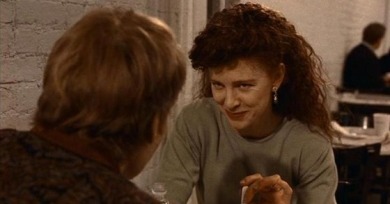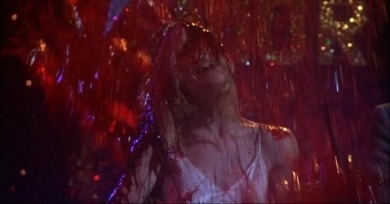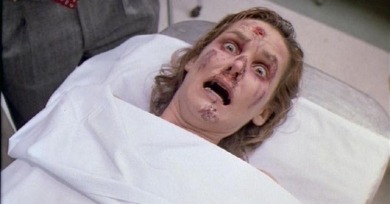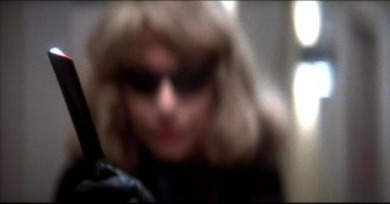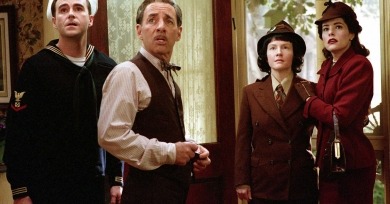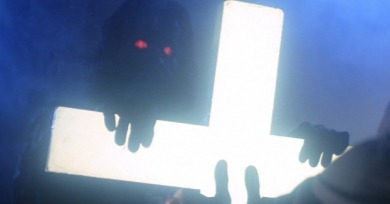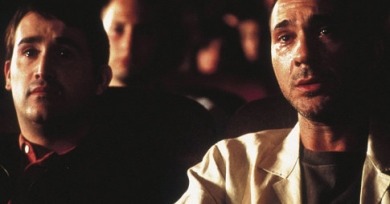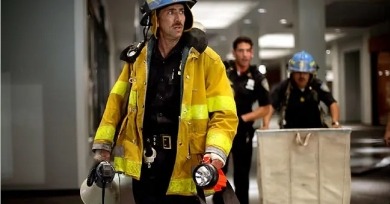Michael Koresky
The Wayward Cloud feels like Tsai’s least perfect film . . . and also his boldest.
Woody Allen’s 1992 Husbands and Wives looks, with each passing year, more and more like the director’s one true post–Crimes and Misdemeanors masterpiece.
It’s a humble complacency that feels missing from most of Woody’s work, which does view wealth and privilege with the same love-hate relationship as Radio Days but also usually aligns itself with the upper-class Manhattan that Woody ascended to.
Coming right after the drenched-in-scandal Husbands and Wives surprised the mainstream movie world by employing jittery, handheld camerawork, Murder Mystery used the same shaky-cam for a completely different effect, lending the film’s intricate and silly crime-caper plot a scatterbrained immediacy.
Literally digging their own graves, the Imperial Army soldiers witnessed in the elegiac Clint Eastwood film Letters from Iwo Jima, bring new meaning to the term walking dead.
A cinephile’s aesthetic or intellectual identity can be formed by his or her resistance to or alignment with De Palma’s sensibility.
Disreputable and trashy, Raising Cain was a “comeback” only in as much as it was merely another jab in the eye of those who found his earlier thriller concoctions needlessly intricate, labyrinthine, and softcore skuzzy.
It’s a survey of the current culture: big, sprawling, and endlessly frightening, told via the minutiae of everyday life, as it’s lived in one Nowheresville Colorado town.
Like John Travolta's Jack Terry, I remain, long after Blow Out’s closing credits, haunted by a scream—so piercing, palpable, so full of anguish.
The greatest focal point of contention surrounding the film is just whose fantasy the film is; already from the steamy, softcore opening shot, which slowly peeks around the corner into an open-doored bathroom, De Palma has established multiple possibilities of point of view, which only become further confused and repeated and doubled.
Home Movies is definitely traceable as a piece of De Palma mischief, but at best it seems a sketch, and at worst unwatchably, smugly makeshift, something that even De Palma’s most woebegone gambits avoid.
Certainly one can’t recognize the film’s central movie-in-the-movie, a ridiculous indie melodrama called “Home for Purim,” as reflecting current Hollywood trends, yet the egos, desperations, and compromises that the crew goes through in For Your Consideration are instantly recognizable.
A Few Great Pumpkins
The Fog, Don’t Look Now, Creepshow, The Innocents, The Last Winter, Haxan, Forbidden Planet, The Legend of Sleepy Hollow
only Talk to Her (and most of All About My Mother) manages to bypass all the possible snags of the slightly overdetermined Almodóvar shtick to become truly intoxicating.
Oliver Stone has always served as a whipping boy for the mainstream press—“outlandish conspiracy theories!” is still muffed about whenever his name pops up, as if he had exclusive rights to JFK’s not-very-outlandish-at-all suppositions—much in the same way that mentions of Spike Lee or Michael Moore are met with casual eye rolls.
Take One inaugurates an ongoing series of symposiums in which our writers will tackle the whole of a film through some fundamental piece of cinematic construction: an edit, musical cue, color, and so on.
Wisely, director/editor/cinematographer Matt Mahurin focuses much of his attention on the food in his laidback, downtown New York restaurant documentary I Like Killing Flies.
Stephens’s balls-out sex comedy may be scattershot, but as everyone by now must know, the see-what-sticks approach comes with the territory.
Fantasia, huge in concept, design, and unveiling, stands as the ultimate expression of Disney’s Wellesian, or perhaps Charles Foster Kane–like stature, the work of a genius, with more than a hint of megalomania.
Robert Altman never makes claims for greatness; each new release portends nothing more than another 100-something minutes of Altman, no larger, no smaller.

